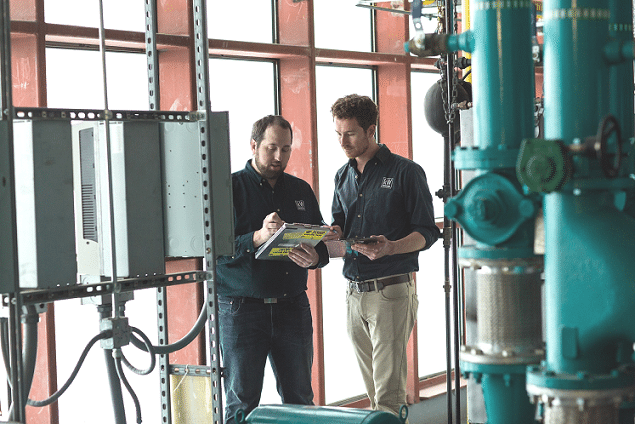When seeking and improved occupant comfort, health and safety, businesses, and institutions may find energy consultants a valuable resource for achieving these goals. Implementing energy saving projects and reducing energy waste in buildings, facilities, and across portfolios, can lower utility bills which results in increased profits and lower carbon emissions. This is energy efficiency in a nutshell, and it is the most cost-effective way of achieving the “triple bottom line” of benefits for people, planet and profit.
An energy consultant works with your organization on identifying and implementing energy cost saving opportunities in your buildings and portfolios that meet fiscal and payback requirements. Energy consultants can support your team from procurement through implementation and beyond to maximize energy savings and ensure ongoing success.
What can an energy consultant do for you?
An energy consultant supplements exiting teams, providing specialized building energy optimization expertise and an outside perspective. An energy consultant’s domain of expertise includes identifying and implementing energy saving projects in your buildings and portfolios. By optimizing building operation of energy using systems, energy consultants can help reduce energy use and increase occupant comfort health and safety. Less energy consumption results in lower utility bills which translates to increased profits and reduced carbon emissions.
Aligning with organizations’ needs and constraints, energy consultants perform a variety of tasks during the three major phases of energy savings projects; planning, implementation and on-going monitoring.
What does an energy consultant do?
Energy consultants help optimize building and portfolio energy use to reduce energy consumption, which results in lower utility bills and carbon emissions. Aligning with organizations’ needs and constraints, energy consultants perform a variety of tasks during the three major phases of energy savings projects, which are planning, implementation and on-going monitoring.
Planning
When getting started planning activities are key for successful and cost-effective projects. Energy consultant tasks may include, but are not limited to:
- identifying energy saving or improved occupant comfort, health and safety opportunities through utility bill analysis, building equipment and controls inspection, and monitoring of building/equipment energy use. This industry term for this process is called an energy audit.
- identifying water savings opportunities through the same avenues noted above.
- identify available no-cost resources or financial incentives available for eligible activities.
- developing strategic energy action plans to meet goals.
- identifying renewable generation and building resiliency options.
- identifying building electrification projects and strategies.
- identifying the best and correct utility rates.
 Implementation
Implementation
Implementation is where the rubber meets the energy efficiency road. Energy consultants help you avoid many common pitfalls utilizing their expertise and help ensure your project meets your expectations, needs and goals. Tasks may include:
- implementing low-cost, energy saving actions through changes in operation, schedules, or controls. Energy consultants call this retro-commissioning.
- assisting with procurement.
- advising during implementation.
- commissioning retrofits or new construction projects to ensure equipment installation and operation matches design specifications.
- measuring and verifying energy savings post-installation, which is formally called measurement and verification (M&V).
On-Going Reporting and Monitoring
Continuing to monitor and report on energy use is key for ensuring savings continue after project installation. Energy consultants can:
- providing ongoing, remote energy monitoring after project completion.
- identify equipment problems when they occur.
How does energy efficiency increase profits?
There are several ways that energy efficiency projects can yield higher profits.
Lower Operating Costs
The biggest contributor to increased profits through energy efficiency is lower operating costs. The equation for increased profits with energy efficiency is simple.
 Using less energy (or water) results in lower utility bills. Spending less on your building operations translates to lower operating costs. With reduced operating costs comes increased profits (with all other variables staying the same of course).
Using less energy (or water) results in lower utility bills. Spending less on your building operations translates to lower operating costs. With reduced operating costs comes increased profits (with all other variables staying the same of course).
Occupant Productivity Benefits
In addition to profit yielded over time due to energy saving, studies show better air quality, temperature comfort, and lighting can result in increased occupant productivity. If your employees are more productive, that can result in increased output, and profits as well.
For additional building health and safety practices to ensure safe building operations during the COVID-19 pandemic, read more here.
Increased Value of Building Stock
Studies also show a positive correlation between certified, high performing, energy efficient buildings and rents. Meaning if you invest in green building development and energy efficiency retrofits, you can also enjoy the financial benefits from higher rental income, and a resulting increase in property value.
Can you benefit from an energy consultant?
If you are a small business or organization with straightforward utility bills, it is likely investing in an energy consultant will not provide the desired return on investment.
However, small, medium or large sized businesses or organizations with complex energy bills, multiple facilities, or different types of operations can benefit from engaging an energy consultant. For smaller businesses we recommend getting in touch with your utility to find out what energy efficiency programs are available in your area. Many utilities offer customized “direct install” programs for smaller facilities that make it quick and easy to identify and install higher efficiency lighting, HVAC and refrigeration upgrades. These programs are often run by a third party that can help navigate complicated choices and simplify the process.
Benefits
1. Expand staff capabilities with personalized service without full-time costs.
When you and your staff are busy with other operational demands and lack the time to support energy saving activities, an energy consultant provides valuable resources. They can also be less costly than hiring an energy manager full-time.
So, when your staff is time-constrained, even if they know what needs to be done, they may not have the time to do it or follow up. An energy consultant can provide to ensure efficient building and equipment operation and on-going energy savings.
You will also benefit from personalized service and strategic planning. A high quality, energy consultant will always work to understand your needs, goals and constraints, and act as if they are a member of your team. Any proposed projects and activities will align with your objectives and expectations to realize your desired outcomes. They can also help you form strategic plans for long-term energy use and sustainability goals.

2. Bring the unique expertise of a team and an outside point of view.
Experienced energy consultants have knowledge and expertise in a variety of unique areas. With an outsourced team, you get the benefit of a larger, specialized team of subject matter experts. At kW, we maintain a staff of specialists in varied areas to answer the needs of highly sophisticated energy users like laboratories, data centers, commercial refrigeration, campuses, high-rise buildings and many others. When you outsource you get the advantage of a whole team of experts in your corner.
Complex Systems
Not all staff may have the expertise to identify and implement equipment retrofits or control changes in your buildings. Energy consultants bring their specialized training and expertise of complex building operations and knowledge of different types of energy using systems, from HVAC to lighting, and various control systems to optimize your buildings and portfolio energy use. Many energy consultants can also identify water saving opportunities.
Sector Specific Building Types
Optimal energy saving projects can look very different across sectors. There are industry specific best practices and energy saving opportunities that energy consultants can identify and implement of which internal staff might not be aware. For example, a grocery store will have different energy saving needs and opportunities than a school district or office building.
Billing Analysis Tools
Using specialized tools and analysis, an energy consultant can easily and quickly identify utility billing errors or anomalies that may lay hidden to in-house staff. At kW we are big fans of Gridium’s rate analysis platform and have used it to identify hundreds of thousands of dollars of savings per year for some of our clients.
Implementation Experience
Energy consultants know what products and companies perform well. Choices involved in sourcing reliable, cost-effective, and accurately sized equipment and choosing quality installers can be overwhelming to procurement staff that may not deal with these types of purchases regularly. Energy consultants can support your staff through this process from bidding through implementation and beyond. This can take on many forms from helping issue a request for proposal, evaluate bidders’ responses, and advise in-house staff during implementation.
Post-Installation Assurance
With limited in-house staff, organizations can benefit from third-party verification of installation and energy savings.
Commissioning equipment after installation ensures operation as designed. It is a valuable energy consultant service and helps ensure your project meets expected returns on investment.
Measurement and verification provides peace of mind that your investment will pay off as intended. Using industry-approved techniques and tools, energy consultants will monitor energy use following equipment installation or control changes to verify expected energy savings.
On-going remote energy monitoring is another unique energy consulting service that frees up your staff’s time and helps maintain and continuously improve your building’s energy performance.
3. Identify and apply for financial incentives for better returns.
You may also be able to shorten payback on energy efficiency investments with no-cost services and financial incentives for eligible activities and projects. Good energy consultants are intimately aware of these services. There are many utility energy efficiency programs available through utilities and third parties across the country that can help reduce the out-of-pocket costs to invest in energy saving projects. An energy consultant can identify and help navigate sometimes complex incentive applications to ensure you receive the maximum, eligible funding.
Hiring an Energy Consultant
You can engage an energy consultant for any phase of your energy saving journey from planning through post-installation. If you are looking for a trusted partner and expert to help manage your energy use, we can help. You can contact us anytime through our contact page. If you’re in Northern California you can reach us at 510.834.6420. We also have regional offices in Southern California, Boise, Salt Lake City and New York. You can find those phone numbers and office locations here.

